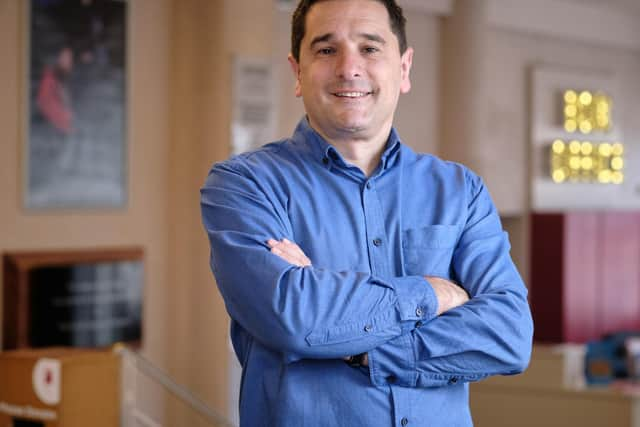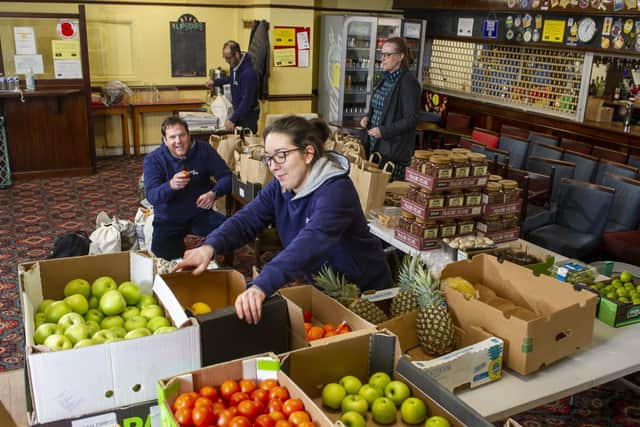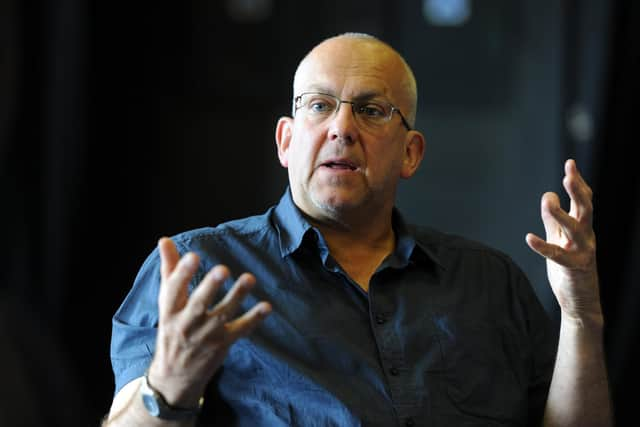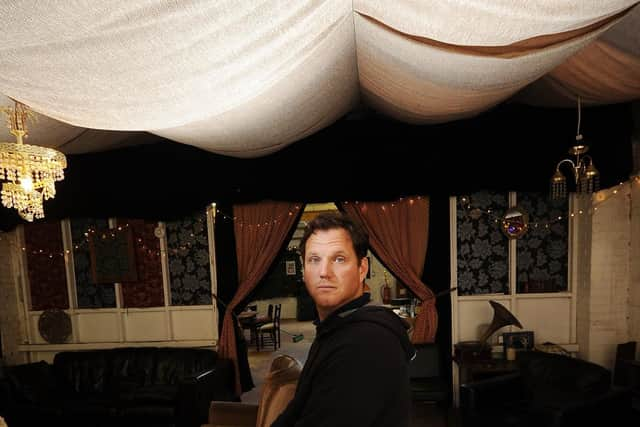Yorkshire's theatres keeping a light on for culture in times of trouble


When theatres first closed there came a moment of fear, amid a dawning realisation that for many their very way of life was to change.
The shift is bigger, when it comes to cultural cohesion. And for Yorkshire’s artistic directors, at sea as the tide turns, that is what matters.
Advertisement
Hide AdAdvertisement
Hide AdWhat we witness in this interlude, they add, is what will one day define us.


“In more indulged times, we can forget what theatre is for,” said Paul Robinson, artistic director at Scarborough’s Stephen Joseph Theatre.
“Culture is intimately sewn into our way of life. It’s about people.
“We are leaving our lights on, as a tiny gesture.”


March 16 marked a stark day for the nation’s theatres when Prime Minister Boris Johnson urged people to stay away.
Advertisement
Hide AdAdvertisement
Hide AdHolbeck’s Slung Low theatre company, housed in the oldest social club in Britain, sees many of its customers arrive every Sunday for a pint of mild.
The directors, acutely aware that many customers were aged over 75, decided to close their doors early, pledging to pay everyone from cleaners to bar staff.
Then artistic director Alan Lane started posting letters, offering to collect food.


What began with the theatre’s immediate neighbours has since grown. Directors are now volunteer guardians of the city wards of Beeston and Holbeck, leading from the Leeds City Council community helpline.
Advertisement
Hide AdAdvertisement
Hide AdEvery day, 40 volunteers join the effort, to help the vulnerable and elderly. The bar staff, guaranteed their salaries regardless, all came back.
They pick up parcels, and pies, for those in isolation. Prescriptions, food deliveries, laundry. Sometimes they just sit and listen.
“We are a theatre company, but we can’t make theatre,” said Mr Lane. “We are putting ourselves to use.”


Moments of joy
Mr Lane’s smile is apparent as he recounts the jollity of an 83-year-old man who threatened him with a walking stick this week, after he mistakenly added a decade to his age.
Advertisement
Hide AdAdvertisement
Hide AdHe has found many joys to be had, but there have been sobering moments as well.
The elderly man with no gas, who has been eating sardines for two weeks, the family in isolation unable to do their laundry as they are without a washing machine.
And the elderly woman, frightened to leave her home to cash her pension, whose shoulders had sagged with relief when she finally held it in her hand.
“We do seem to have turned a corner, and not in a good way,” Mr Lane says. “We were laughing with them, just a few days ago. Now we’re not. They are frantic.


Advertisement
Hide AdAdvertisement
Hide Ad“We are able, one or two times a day, to create a situation where we can bring a little bit of relief. We will carry on as long as we are healthy.”
Donations of food have come from the Real Junk Food project, supermarkets, and Leeds Council.
“These are people who have never been in the system,” says Mr Lane. “That is causing them a lot of pain, emotionally.
“We’ve got the logistical skills, the manpower and a van. We are finding that, as artists, what is just as important is our ability to listen, to talk.”
Playwright
Advertisement
Hide AdAdvertisement
Hide AdAcclaimed playwright John Godber’s Angels of the North premiered at Wakefield’s Theatre Royal this year.
A play about northern communities left behind in last year’s General Election, it had all but sold out in Beverley and was on its way to the West End.
Knowing it was only a matter of time, and not wanting to put people at risk, he too had pulled the show early.
The hit he has taken is irrelevant, he says, in the face of such a cost to so many, and the selflessness of NHS staff.
Advertisement
Hide AdAdvertisement
Hide AdThey are nimble, he adds, quick to react and when the time comes, to return.
But he does wonder what will come from these dark times, which will certainly see theatre redefined.
“I’ve done rather a lot of plays, and those plays are all over the world, but the world has suspended theatre,” he says.
“I’m not sure what any of us will want to see come August,” he adds.
Advertisement
Hide AdAdvertisement
Hide Ad“These fellows have got to keep the lights on. We need these venues to be going. We need life to continue.
“In the words of Sir Alan Ayckbourn, ‘we need good schools, and good hospitals, and good theatres, so that well-educated, healthy people have somewhere to go at night’.”
Difficult decisions
In Scarborough, joint chief executives Mr Robinson and Caroline Routh had gone from scenario planning at the Stephen Joseph Theatre to suddenly closed.
The hardest task, and the most urgent, was in deciding who to furlough.
Advertisement
Hide AdAdvertisement
Hide AdLooking at contracted hours, they had tried to define what could put a person in a difficult position financially.
But then they came to realise that one man, working just 12 hours, was reliant on that income to cover a mortgage.
“That was really arresting to realise,” says Mr Robinson.
The theatre, with some reserves, has agreed to match usual salaries.
“Up here, and because the cost of living is relatively low, those kind of hours make the difference between someone being able to make a living.
Advertisement
Hide AdAdvertisement
Hide Ad“If someone loses a job in the theatre up here, there aren’t any others to go to.
“It does put the cultural offer into perspective. In Scarborough, which is quite different to London, we are the cultural amp. We are it.”
There is a community kitchen in Scarborough, formed in recent days by cafe owners to ensure a decent meal is available to anyone that needs it.
Many of the theatre’s staff are now volunteering. Others, calling up ticket holders to cancel plays, are spending hours on the phone as a listening ear.
Advertisement
Hide AdAdvertisement
Hide AdThe closure of the theatre had come as a blow, said Mr Robinson, but right now the country’s culture is being re-written. In the behaviours of society, in adapting to a new normal.
The arts’ products that will be born from that is yet to be defined. What matters today, he adds, is being a part of it.
“That is the cultural thing. That’s what we need to be doing now.
“I really hope people hold onto this, when we get back to normal,” he adds. “It’s a different type of nourishment.”
Advertisement
Hide AdAdvertisement
Hide AdEditor’s note: first and foremost - and rarely have I written down these words with more sincerity - I hope this finds you well.
Almost certainly you are here because you value the quality and the integrity of the journalism produced by The Yorkshire Post’s journalists - almost all of which live alongside you in Yorkshire, spending the wages they earn with Yorkshire businesses - who last year took this title to the industry watchdog’s Most Trusted Newspaper in Britain accolade.
And that is why I must make an urgent request of you: as advertising revenue declines, your support becomes evermore crucial to the maintenance of the journalistic standards expected of The Yorkshire Post. If you can, safely, please buy a paper or take up a subscription. We want to continue to make you proud of Yorkshire’s National Newspaper but we are going to need your help.
Postal subscription copies can be ordered by calling 0330 4030066 or by emailing [email protected]. Vouchers, to be exchanged at retail sales outlets - our newsagents need you, too - can be subscribed to by contacting subscriptions on 0330 1235950 or by visiting www.localsubsplus.co.uk where you should select The Yorkshire Post from the list of titles available.
Advertisement
Hide AdAdvertisement
Hide AdIf you want to help right now, download our tablet app from the App / Play Stores. Every contribution you make helps to provide this county with the best regional journalism in the country.
Sincerely. Thank you.
James Mitchinson
Editor
